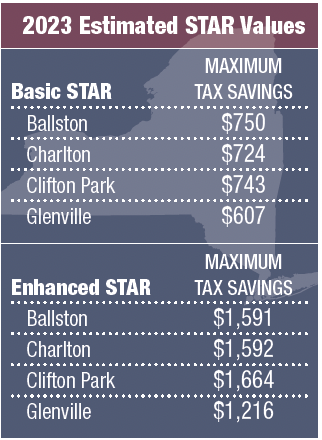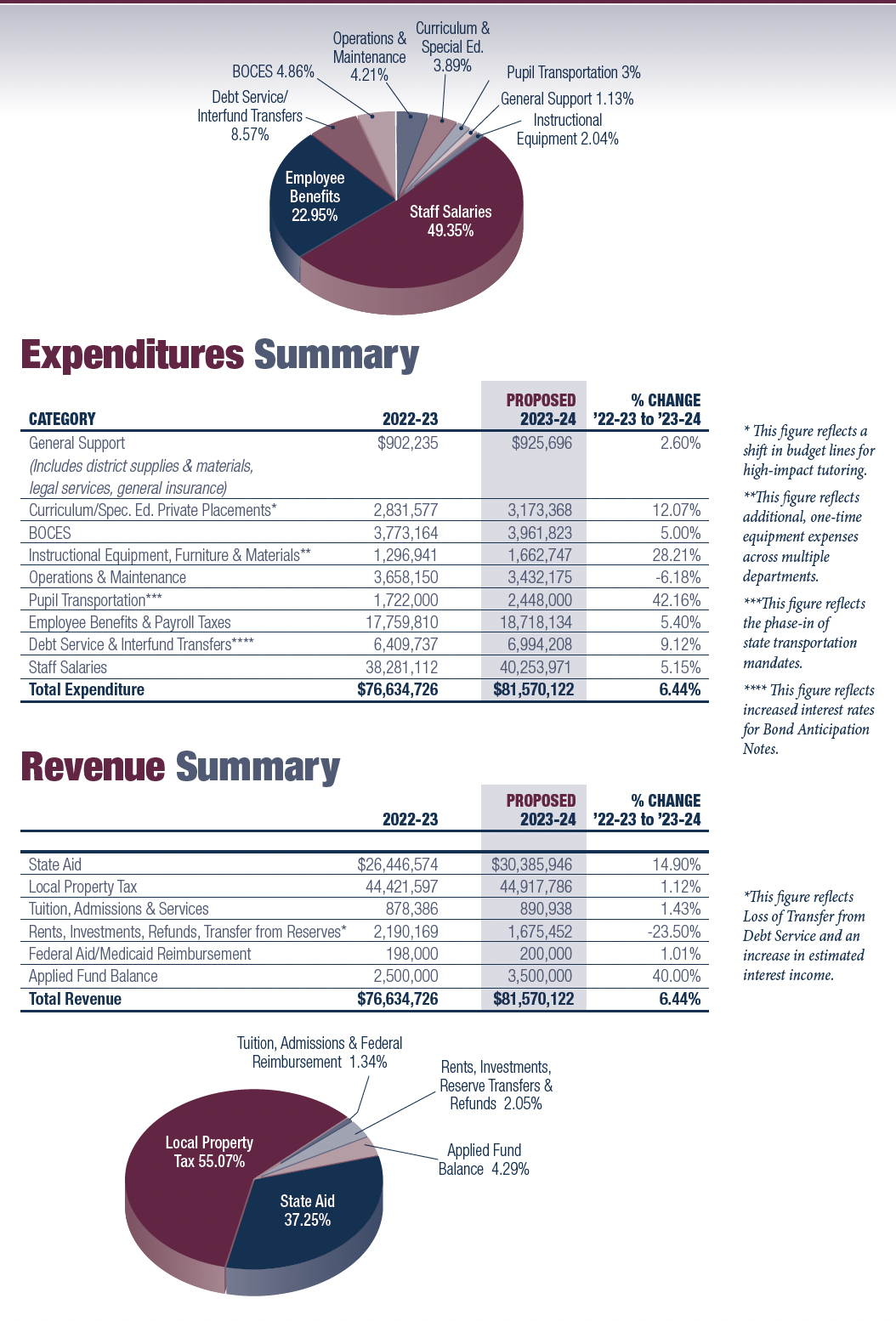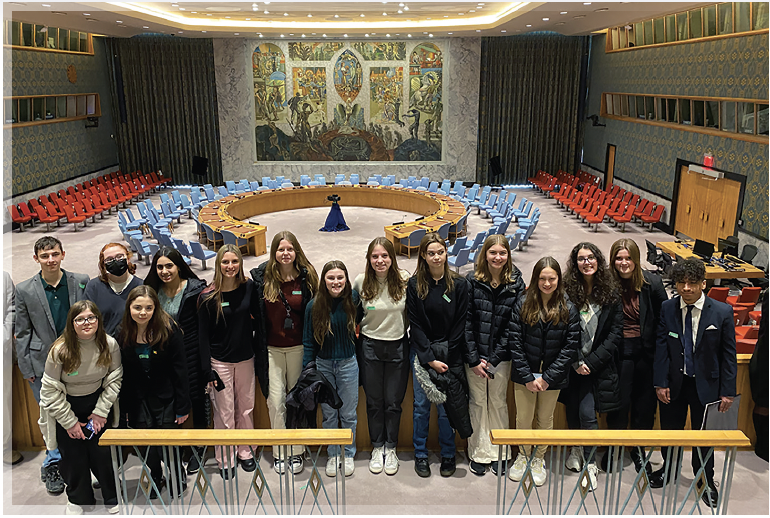Board proposes 2023-24 budget with estimated average 0% tax rate increase
Proposal supports academic & social-emotional support services for students
Budget At A Glance
- Proposed Budget: $81,570,122
- Estimated Average Tax Rate Increase: 0%
- Tax Levy Increase: 1.12%
- Budget-to-Budget Increase: 6.44%
On Tuesday, May 16, Burnt Hills-Ballston Lake School District residents will go to the polls to vote on a proposed $81,570,122 budget for the 2023-24 school year. Polls will be open from 7 a.m. to 9 p.m. in the gym at BH-BL High School, 88 Lakehill Rd.
The proposed 2023-24 budget carries a 1.12% tax levy increase with an estimated average 0% tax rate increase, making this the 12th consecutive year the district has proposed a budget below the state’s tax cap. [DOWNLOAD A PDF OF THE BUDGET NEWSLETTER]
Overall spending in the proposed budget will increase by $4.93 million, or 6.44 percent. This increase is due in large part to shifting grant-funded programs and services into the general operating budget. The increase, however, will be offset by a higher than usual increase in foundation aid and the modest growth within the community (i.e., new homes, businesses).
“Reaching the fully funded level of state foundation aid is welcome news for BH-BL,” says Assistant Superintendent for Support Services Dr. Christopher Abdoo. “This increase of $3.8 million in aid allows us to propose a budget that adds programs and services for students, while still carrying an estimated average tax rate increase of 0 percent.”
“Yet, a note of caution is that the district is not likely to see this level of increase in future budget cycles, which is why everything included in the proposed budget has been analyzed for its educational and financial impact over both the short and long term,” adds Abdoo.
DRIVING FACTORS IN BUDGET DEVELOPMENT
In December, when school leaders and the Board of Education began the budget development process they focused on several factors they knew would impact the 2023-24 and future budgets. These are higher inflation rates, an increase to state foundation aid, aging buildings that require frequent repairs/upkeep, and expiring federal grants that are supporting current programs and services.
School districts, like everyone else, are impacted by the higher inflation rates. BH-BL experienced a rise in costs for health insurance, energy, interest on capital project borrowing, and supplies—everything from classroom and instructional materials to cleaning supplies.
Additionally, the limited-time federal grants allocated to districts to help them recover from the global pandemic by funding services and staffing for additional academic and other supports for students, are expiring in the next two budget cycles.
Superintendent of Schools Dr. Patrick McGrath explains that the support programming and staff the district put in place with the grant funding had actually been a long-term goal of the district.
“The additional assistance we put in place is proving to have positive impacts on our students,” says McGrath. “Targeted academic support in math and reading, as well as from increased social-emotional connections through an expanded counseling program and extracurricular offerings have clearly benefited our students. In fact, these initiatives and opportunities have worked so well that we are seeking to maintain them beyond the life of the federal grants.”
WHAT’S BEING PROPOSED FOR NEXT SCHOOL YEAR?
The additional state Foundation Aid will make it possible for BH-BL to continue the support programming (originally funded through federal grants) by shifting expenses to the general operating budget.
“Next year, the combination of federal grants and the operating budget will ensure that we can preserve or expand upon the district’s strong academic programming as well as student-centered services and opportunities,” says Assistant Superintendent for Curriculum and Instruction Dr. David Collins.”
This includes:
- Maintaining the elementary-level science enrichment program (PACE) that introduces students to enhanced academic opportunities beyond the general classroom.
- Sustaining the high-impact tutoring services for students who benefit from one-to-one assistance in certain subject areas.
- Restoring a portion of the elementary reading program (reduced in 2019-20) by adding a reading specialist to provide Response to Intervention (RtI) services.
- Maintaining Academic Intervention Services (AIS) for English Language Arts (ELA) and math support at O’Rourke Middle School.
- Maintaining three full-time and one part-time Special Education positions at the elementary level based on student and programming needs.
- Securing one full-time counseling position at each elementary school for facilitating academic planning and goal setting, building character traits and strengthening interpersonal skills as well as providing individualized services and guidance to support healthy minds.
- Maintaining grant-funded elementary sections to provide optimal student-teacher ratios in the classroom.
- Adding three full-time and one part-time staff positions in various certifications to create an additional half team for 7th and 8th grade based upon increased enrollment.
- Adding another English as a New Language (ENL) teaching position based upon increased need.
- Implementing a girls wrestling program in response to the growing popularity of the sport and the level of interest among students.
- Introducing a new K-5 literacy program (including materials and staff training). The new program better aligns with the English Language Arts curriculum and standards.
- Funding for new equipment for the athletics and Fine Arts programs, as well as for the maintenance and custodial departments. Several items in these departments have exceeded their use expectancy or become too costly to repair. Often times, replacement parts are unavailable.
- Expanding the Model United Nations program by adding more conference opportunities in response to the increased interest and participation of students. (See page 8.)
- Continuing to broaden the high school’s Distance Learning program by offering more classes across different subject areas. BH-BL currently offers 23 distance learning classes on the network.
“This program provides the opportunity for our students to learn in the same classroom as students from diverse background across the state and provides revenue to maintain and grow our academic programming,” adds Collins.
- Supporting school improvement efforts while the district is in between larger capital improvement projects. Improvements include replacing floors made with asbestos and modernizing classrooms for today’s inclusive, collaborative learning environments. All of BH-BL’s buildings are between 70 and 100 years old. For that reason, school leaders we will continue to stay on a five-year cycle for bond referendums, with the next one planned for October 2023.
“The budget puzzle involves balancing all of these items while being sensitive to our community’s ability to support it,” says McGrath. “In the end, this budget keeps us true to our mission of over 100 years: We are parents, teachers, community members, and school leaders all working together to create a world-class education for BH-BL students.”
What happens if voters do not approve the proposed budget?
Under New York State law, if the school budget is defeated, the BH-BL Board of Education typically has two options: put the same or a modified budget up for another vote on the third Tuesday in June, or immediately adopt a contingent budget. If residents defeat the proposed budget during a second vote, the board must adopt a contingent budget.
CONTINGENT BUDGET RULES
Under New York state law, districts that adopt a contingent budget cannot increase the current tax levy by any amount—resulting in a zero percent tax levy increase.
Bringing the BH-BL tax levy increase down to zero would force the board to reduce the proposed budget by $496,189. In doing this, the board may not be able to adhere to its goal of preserving student programs and services or staff, or restoring staffing from prior years. It would also likely have to make a number of staff reductions across all schools, which would increase class sizes.
Adopting a contingent budget also prohibits a district from spending any money in certain areas, including community use of school facilities (unless all costs are reimbursed to the district); new equipment purchases including school buses; nonessential maintenance; capital expenditures (except in emergencies); salary increases for non-instructional and non-unionized employees; and certain field trips and student supplies.
These requirements existed prior to the tax levy cap and remain in effect.
Are new buses being purchased for next year?
Yes, but the cost of the new buses is included in the budget proposal rather than as a separate proposition. Bus purchases are done this way so the district doesn’t have to borrow funds and incur debt. The proposal includes $1,557,072* for the purchase of a 77-passenger bus, a 72-passenger bus, two 70-passenger electric buses, two 30-passenger buses, and a 21-passenger wheelchair accessible bus to replace some of the district’s oldest buses. (*It is possible that the district may need to purchase a towing vehicle. However, at the time this newsletter went to print that decision wasn’t final. If this occurs, the total purchase amount of buses would become $1,671,000.)
The district anticipates being reimbursed approximately 72.5 percent of the cost of the buses through state transportation aid in subsequent years, resulting in a net local cost of approximately $459,525. Additionally, by purchasing buses outright, the district saves an estimated $15,000 annually in interest and legal fees associated with borrowing funds.
BUS REPLACEMENT PLAN
The buses scheduled to be replaced in the 2023-24 school year are among the oldest in the district’s fleet and have already accumulated high mileage, exceeded their warranties, and undergone many maintenance repairs. Beyond certain limits, buses typically become too costly to maintain given the state’s stringent safety codes. Furthermore, new school buses are aligned with the latest safety and emissions standards and have better fuel economy rates.
BH-BL’s 69-bus fleet travels more than 750,000 miles a year, transporting more than 3,100 students to and from its five schools. The buses are also used for sporting events, out-of-district runs, shared transportation runs, field trips, summer school, and other events.
In order to keep buses in safe working order, the district’s long-standing policy has been to replace several of the oldest buses each year.
Are there any tax savings programs available to help taxpayers?
Homeowners can receive a property tax exemption or credit under the School Tax Relief (STAR) program.
The Basic STAR* exemption or credit is available on a homeowner’s primary residence for anyone who owns and lives in his/her own home. Homeowners who earn $500,000 or less can receive a STAR credit. Homeowners earning $250,000 or less can receive a STAR exemption or credit.
The Enhanced STAR exemption is available on the primary residence of taxpayers age 65 and older with yearly incomes of $93,200 or less.
OTHER TAX RELIEF OPTIONS
BH-BL residents over the age of 65 with incomes of $37,400 or less also can be exempted from paying school taxes on 5 to 50 percent of their home’s assessed value depending on their exact income. The district also grants a disability exemption, ranging from 5 to 50 percent, for qualifying residents of any age with disabilities and incomes of less than $37,400.
The board adopted the Alternative Veterans’ Tax Exemption at level 1, which allows qualifying veterans to be exempted from paying school taxes on a portion of their home’s assessed value depending on their military service.
Applications for these district exemptions and the state’s STAR program must be filed with your town assessor’s office. Please visit your town’s website or call your town assessor if you have questions.
*STAR Program Savings: Please contact your town assessor’s office to learn more about the latest requirements for residents participating in the STAR program.
Is there another proposition on the ballot?
In addition to the first proposition (the 2023-24 budget) residents will also be asked to vote on a second proposition reauthorizing an ex officio student member position on the BH-BL Board of Education. By law, residents must approve this proposition every two years.
This proposition was first proposed and approved in May 2015. For the past eight years, a different high school student each school year has been appointed as an ex officio member.
The student member attends board meetings, sits at the board table, and contributes to public discussions. He or she does not vote and does not attend executive sessions. The student board member is an incoming senior who is selected by his or her peers.
Model United Nations program to expand next school year
In March, more than two dozen students in the high school’s CIVITAS Club participated in a Model United Nations (UN) conference in New York City. Model UN is an educational simulation centered around a series of programs run internationally with the goals of furthering understanding about the United Nations, educating students about international relations and world issues, and promoting peace and the work of the UN through cooperation and diplomacy. BH-BL students in Model UN prepare all year to participate in the annual conference.
“This year, our school was assigned the country Senegal,” explains high school senior and Model UN participant Mary Hayden.
“The club’s advisors, Mrs. Tolan and Ms. Fay, worked with all of us to help us identify our personal preferences in regards to our research interests and then assigned us to respective committees.”
For instance, Hayden was assigned UNICEF (United Nations International Children’s Emergency Fund) and, like the other committees, she was given two topics to research: finding solutions for housing insecurity for children worldwide and determining ways to increase literacy rates for children. Model UN participants are required to write a position paper about their stance on the topic and support it with research.
At the conference, committee sessions rotated through the speakers list, moderated caucuses, and unmoderated caucuses, which is where some students find themselves contributing to discussions. It was during these sessions that blocs were formed and resolutions were written, explains Hayden.
In addition to the conference, students took a guided tour of the United Nations Headquarters, met and attended presentations by Senegalese UN delegates, visited the Metropolitan Museum of Art, and dined at an authentic West African restaurant to sample Senegalese cuisine.
The budget proposal includes funding for additional conferences to allow students the opportunity to become more deeply involved in the program.
“Going to New York City for four days for Model UN created the best four days of my life thus far,” says Hayden. “To be able to travel and learn with 30 of my friends and classmates was an invaluable and unforgettable experience. The Model UN conference is so applicable to our lives now because the UN evolves and changes at the same speed that the world does. Therefore, the conference gives students the opportunity to become more fluent on current events and issues while crafting and improving their critical thinking and public speaking skills, simultaneously inspiring them to become a part of worthwhile, positive change. The chance for this program to expand excites me, as students will have additional opportunities to foster these skills and immerse themselves in a different culture through pre-research and the conference. I couldn’t recommend Model UN more and look forward to students continuing to enrich their high school experience through participation in this program.”
Voting Information
Voter Qualifications
All voters must be United States citizens, age 18 or older on election day, residents of the BH-BL School District for 30 days immediately prior to election day, and registered.
Registering to Vote
You are already registered to vote on May 16 if you are registered with your county Board of Elections to vote in a general election.
Absentee Ballots
Registered voters may vote by absentee ballot if they are unable to appear at the polling place on May 16.
To receive an absentee ballot, first fill out an application which can be obtained from Deputy Clerk of the Board Rebecca Manson at the district office. The application can also be downloaded from the BH-BL website at www.bhbl.org/budget/ voting-information/
The completed application must be returned to Rebecca Manson at least seven days before the election if the ballot is to be mailed to the voter, or at least one day before the election if the ballot is to be picked up personally by the voter at the district office from 8 a.m. to 4 p.m.
Absentee ballots will be counted only if they are returned to the clerk no later than 5 p.m. on May 16. For more information, call 518-399- 9141, ext. 85025.



